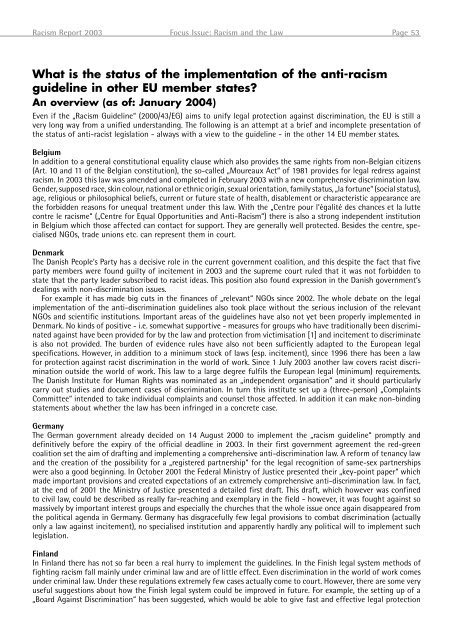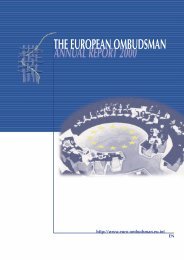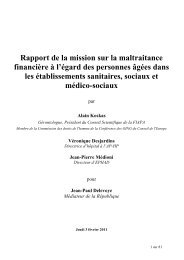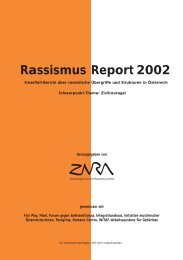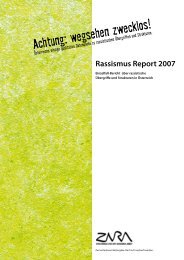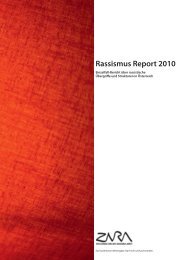Racism Report 2003 - Zara
Racism Report 2003 - Zara
Racism Report 2003 - Zara
You also want an ePaper? Increase the reach of your titles
YUMPU automatically turns print PDFs into web optimized ePapers that Google loves.
<strong>Racism</strong> <strong>Report</strong> <strong>2003</strong> Focus Issue: <strong>Racism</strong> and the Law Page 53What is the status of the implementation of the anti-racismguideline in other EU member states?An overview (as of: January 2004)Even if the „<strong>Racism</strong> Guideline“ (2000/43/EG) aims to unify legal protection against discrimination, the EU is still avery long way from a unified understanding. The following is an attempt at a brief and incomplete presentation ofthe status of anti-racist legislation - always with a view to the guideline - in the other 14 EU member states.BelgiumIn addition to a general constitutional equality clause which also provides the same rights from non-Belgian citizens(Art. 10 and 11 of the Belgian constitution), the so-called „Moureaux Act“ of 1981 provides for legal redress againstracism. In <strong>2003</strong> this law was amended and completed in February <strong>2003</strong> with a new comprehensive discrimination law.Gender, supposed race, skin colour, national or ethnic origin, sexual orientation, family status, „la fortune“ (social status),age, religious or philosophical beliefs, current or future state of health, disablement or characteristic appearance arethe forbidden reasons for unequal treatment under this law. With the „Centre pour l‘égalité des chances et la luttecontre le racisme“ („Centre for Equal Opportunities and Anti-<strong>Racism</strong>“) there is also a strong independent institutionin Belgium which those affected can contact for support. They are generally well protected. Besides the centre, specialisedNGOs, trade unions etc. can represent them in court.DenmarkThe Danish People‘s Party has a decisive role in the current government coalition, and this despite the fact that fiveparty members were found guilty of incitement in <strong>2003</strong> and the supreme court ruled that it was not forbidden tostate that the party leader subscribed to racist ideas. This position also found expression in the Danish government‘sdealings with non-discrimination issues.For example it has made big cuts in the finances of „relevant“ NGOs since 2002. The whole debate on the legalimplementation of the anti-discrimination guidelines also took place without the serious inclusion of the relevantNGOs and scientific institutions. Important areas of the guidelines have also not yet been properly implemented inDenmark. No kinds of positive - i.e. somewhat supportive - measures for groups who have traditionally been discriminatedagainst have been provided for by the law and protection from victimisation [1] and incitement to discriminateis also not provided. The burden of evidence rules have also not been sufficiently adapted to the European legalspecifications. However, in addition to a minimum stock of laws (esp. incitement), since 1996 there has been a lawfor protection against racist discrimination in the world of work. Since 1 July <strong>2003</strong> another law covers racist discriminationoutside the world of work. This law to a large degree fulfils the European legal (minimum) requirements.The Danish Institute for Human Rights was nominated as an „independent organisation“ and it should particularlycarry out studies and document cases of discrimination. In turn this institute set up a (three-person) „ComplaintsCommittee“ intended to take individual complaints and counsel those affected. In addition it can make non-bindingstatements about whether the law has been infringed in a concrete case.GermanyThe German government already decided on 14 August 2000 to implement the „racism guideline“ promptly anddefinitively before the expiry of the official deadline in <strong>2003</strong>. In their first government agreement the red-greencoalition set the aim of drafting and implementing a comprehensive anti-discrimination law. A reform of tenancy lawand the creation of the possibility for a „registered partnership“ for the legal recognition of same-sex partnershipswere also a good beginning. In October 2001 the Federal Ministry of Justice presented their „key-point paper“ whichmade important provisions and created expectations of an extremely comprehensive anti-discrimination law. In fact,at the end of 2001 the Ministry of Justice presented a detailed first draft. This draft, which however was confinedto civil law, could be described as really far-reaching and exemplary in the field - however, it was fought against somassively by important interest groups and especially the churches that the whole issue once again disappeared fromthe political agenda in Germany. Germany has disgracefully few legal provisions to combat discrimination (actuallyonly a law against incitement), no specialised institution and apparently hardly any political will to implement suchlegislation.FinlandIn Finland there has not so far been a real hurry to implement the guidelines. In the Finish legal system methods offighting racism fall mainly under criminal law and are of little effect. Even discrimination in the world of work comesunder criminal law. Under these regulations extremely few cases actually come to court. However, there are some veryuseful suggestions about how the Finish legal system could be improved in future. For example, the setting up of a„Board Against Discrimination“ has been suggested, which would be able to give fast and effective legal protection


